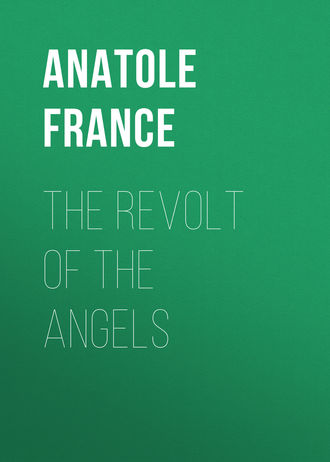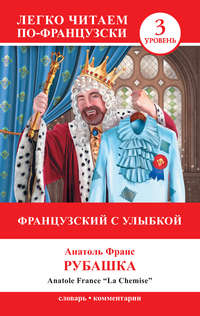 полная версия
полная версияThe Revolt of the Angels
With nails, to which fury lent an added edge, she tore at the cheeks and eyelids of the Kerûb, and, though he held her as in a vice, she arched herself so stiffly and made such excellent play with knee and elbow, that the human-headed bull, blinded with blood and rage, was sent crashing into the piano which gave forth a prolonged groan, while the bombs, tumbling out of his pockets, fell on the floor with a noise like thunder. And Bouchotte, with dishevelled locks, and one breast bare, beautiful and terrible, stood brandishing the poker over the prostrate giant, crying:
"Be off with you, or I'll put your eyes out!"
Prince Istar went to wash himself in the kitchen, and plunged his gory visage into a basin where some haricot beans lay soaking; then he withdrew without anger or resentment, for he had a noble soul.
Scarcely had he gone when the door-bell rang. Bouchotte, calling upon the absent maid in vain, slipped on a dressing-gown and opened the door herself. A young man, very correct in appearance and rather good-looking, bowed politely, and apologising for having to introduce himself, gave his name. It was Maurice d'Esparvieu.
Maurice was still seeking his guardian angel. Upheld by a desperate hope, he sought him in the queerest places. He enquired for him at the houses of sorcerers, magicians, and thaumaturgists, who in filthy hovels lay bare the ineffable secrets of the future, and who, though masters of all the treasures of the earth, wear trousers without any seats to them, and eat pigs' brains. That very day, having been to a back street in Montmartre to consult a priest of Satan, who practised black magic by piercing waxen images, Maurice had gone on to Bouchotte's, having been sent by Madame de la Verdelière, who, being about to give a fête in aid of the fund for the Preservation of Country Churches, was anxious to secure Bouchotte's services, since she had suddenly become – no one knew why – a fashionable artiste.
Bouchotte invited the visitor to sit down on the little flowered couch; at his request she seated herself beside him, and our young man of fashion explained to the singer what Madame de la Verdelière desired of her. The lady wished Bouchotte to sing one of those apache songs which were giving such delight in the fashionable world. Unfortunately Madame de la Verdelière could only offer a very modest fee, one out of all proportion to the merits of the artiste, but then it was for a good cause.
Bouchotte agreed to take part, and accepted the reduced fee with the accustomed liberality of the poor towards the rich and of artists towards society people. Bouchotte was not a selfish girl; the work for the preservation of country churches interested her. She remembered with sobs and tears her first communion, and she still retained her faith. When she passed by a church she wanted to enter it, especially in the evening. And so she did not love the Republic which had done its utmost to destroy both the Church and the Army. Her heart rejoiced to see the re-birth of national sentiment. France was lifting up her head. What was most applauded in the music halls were songs about the soldiers and the kind nuns. Meanwhile Maurice inhaled the odour of her tawny hair, the subtle bitter perfume of her body, all the odours of her person, and desire grew in him. He felt her near him on the little couch, very warm and very soft. He complimented the artiste on her great talent. She asked him what he liked best in all her repertory. He knew nothing about it, still he made replies that satisfied her. She had dictated them herself without knowing it. The vain creature spoke of her talent, of her success, as she wished others to speak of them. She never ceased talking of her triumphs, yet withal she was candour itself. Maurice in all sincerity praised Bouchotte's beauty, her fresh skin, her purity of line. She attributed this advantage to the fact that she never made up and never "put messes on her face." As to her figure, she admitted that there was enough everywhere and none too much, and to illustrate this assertion she passed her hand over all the contours of her charming body, rising lightly to follow the delightful curves on which she reposed.
Maurice was quite moved by it. It began to grow dark; she offered to light up. He begged her to do nothing of the sort.
Their talk, at first gay and full of laughter, grew more intimate and very sweet, with a certain languor in its tone. It seemed to Bouchotte that she had known Monsieur Maurice d'Esparvieu for a long time, and holding him for a man of delicacy, she gave him her confidence. She told him that she was by nature a good woman, but that she had had a grasping and unscrupulous mother. Maurice recalled her to the consideration of her own beauty, and exalted by subtle flattery the excellent opinion she had of herself. Patient and calculating, in spite of the burning desire growing in him, he aroused and increased in the desired one the longing to be still further admired. The dressing-gown opened and slipped down of its own accord, the living satin of her shoulders gleamed in the mysterious light of evening. He – so prudent, so clever, so adroit, – let her sink in his arms, ardent and half swooning before she had even perceived she had granted anything at all. Their breath and their murmurs intermingled. And the little flowery couch sighed in sympathy with them.
When they recovered the power to express their feelings in words, she whispered in his ear that his cheek was even softer than her own.
He answered, holding her embraced:
"It is charming to hold you like this. One would think you had no bones."
She replied, closing her eyes:
"It is because I love you. Love seems to dissolve my bones; it makes me as soft and melting as a pig's foot à la Ste. Menebould."
Hereupon Théophile came in, and Bouchotte called upon him to thank Monsieur Maurice d'Esparvieu, who had been amiable enough to be the bearer of a handsome offer from Madame la Comtesse de la Verdelière.
The musician was happy, feeling the quiet and peace of the house after a day of fruitless applications, of colourless lessons, of failure and humiliation. Three new collaborators had been thrust upon him who would add their signatures to his on his operetta, and receive their share of the author's rights, and he had been told to introduce the tango into the Court of Golconda. He pressed young d'Esparvieu's hand and dropped wearily on to the little couch, which, being now at the end of its strength, gave way at the four legs and suddenly collapsed.
And the angel, precipitated to the ground, rolled terror-struck on to the watch, match-box and cigarette-case that had fallen from Maurice's pocket, and on to the bombs Prince Istar had left behind him.
CHAPTER XXIV
CONTAINING AN ACCOUNT OF THE VICISSITUDES THAT BEFEL THE "LUCRETIUS" OF THE PRIOR DE VENDÔME
LÉGER-MASSIEU, successor to Léger senior, the binder, whose establishment was in the rue de l'Abbaye, opposite the old Hôtel of the Abbés of Saint Germain-des-Près, in the hotbed of ancient schools and learned societies, employed an excellent but by no means numerous staff of workmen, and served with leisurely deliberation a clientèle who had learned to practise the virtue of patience. Six weeks had elapsed since he had received the parcel of books that had been despatched by Monsieur Sariette, but still Léger-Massieu had not yet put the work in hand. It was not until fifty-three days had come and gone, that, after calling over the books against the list that had been drawn up by Monsieur Sariette, the binder gave them out to his workmen. The little Lucretius with the Prior de Vendôme's arms not being mentioned on the list, it was assumed that it had been sent by another customer.
And as it did not figure on any list of goods received it remained shut up in a cupboard, from which Léger-Massieu's son, the youthful Ernest, one day surreptitiously abstracted it, and slipped it into his pocket. Ernest was in love with a neighbouring seamstress whose name was Rose. Rose was fond of the country, and liked to hear the birds singing in the woods, and in order to procure the wherewithal to take her to Chatou one Sunday and give her a dinner, Ernest parted with the Lucretius for ten francs to old Moranger, a second-hand dealer in the rue Saint X – , who displayed no great curiosity regarding the origin of his acquisitions. Old Moranger handed over the volume, the very same day, to Monsieur Poussard, an expert in books, of the faubourg Saint Germain, for sixty francs. The latter removed the stamp which disclosed the ownership of the matchless copy, and sold it for five hundred francs to Monsieur Joseph Meyer, the well-known collector, who handed it straight away for three thousand francs to Monsieur Ardon, the bookseller, who immediately transferred it to Monsieur R – , the great Parisian bibliopolist, who gave six thousand for it, and sold it again a fortnight later at a handsome profit to Madame la Comtesse de Gorce. Well known in the higher ranks of Parisian society, the lady in question is what was called in the seventeenth century a "curieuse," that is to say, a lover of pictures, books, and china. In her mansion in the Avenue d'Jéna she possesses collections of works of art which bear witness to the diversity of her knowledge and the excellence of her taste. During the month of July, while the Comtesse de Gorce was away at her château at Sarville in Normandy, the house in the Avenue d'Jéna, being unoccupied, was visited one night by a thief said to belong to a gang known as "The Collectors," who made works of art the special objects of their raids.
The police enquiry elicited the fact that the marauder had reached the first floor by means of the waste-pipe, that he had then climbed over the balcony, forced a shutter with a jemmy, broken a pane of glass, turned the window-fastener, and made his way into the long gallery. There he broke open several cupboards and possessed himself of whatever took his fancy. His booty consisted for the most part of small but valuable articles, such as gold caskets, a few ivory carvings of the fourteenth century, two splendid fifteenth-century manuscripts, and a volume which the Countess's secretary briefly described as "a morocco-bound book with a coat of arms on it," and which was none other than the Lucretius from the d'Esparvieu library.
The malefactor, who was supposed to be an English cook, was never discovered. But, two months or so after the theft, a well-dressed, clean-shaven young man passed down the rue de Courcelles, in the dimness of twilight, and went to offer the Prior de Vendôme's Lucretius to Père Guinardon. The antiquary gave him four shillings for it, examined it carefully, recognised its interest and its beauty, and put it in the king-wood cabinet, where he kept his special treasures.
Such were the vicissitudes which, in the course of a single season, befel this thing of beauty.
CHAPTER XXV
WHEREIN MAURICE FINDS HIS ANGEL AGAIN
THE performance was over. Bouchotte in her dressing-room was taking off her make-up, when the door opened softly and old Monsieur Sandraque, her protector, came in, followed by a troop of her other admirers. Without so much as turning her head, she asked them what they meant by coming and staring at her like a pack of imbeciles, and whether they thought they were in a tent at the Neuilly Fair, looking at the freak woman.
"Now, then, ladies and gentlemen," she rattled on derisively, "just put a penny in the box for the young lady's marriage-portion, and she'll let you feel her legs, – all made of marble!"
Then, with an angry glance at the admiring throng, she exclaimed: "Come, off you go! Look alive!"
She sent them all packing, her sweetheart Théophile among them, – the pale-faced, long-haired, gentle, melancholy, short-sighted, and dreamy Théophile.
But recognizing her little Maurice, she gave him a smile. He approached her, and leaning over the back of the chair on which she was seated, congratulated her on her playing and singing, duly performing a kiss at the end of every compliment. She did not let him escape thus, and with reiterated enquiries, pressing solicitations, feigned incredulity, obliged him to repeat his stock panegyrics three or four times over, and when he stopped she seemed so disappointed that he was forced to take up the strain again immediately. He found it trying, for he was no connoisseur, but he had the pleasure of kissing her plump curved shoulders all golden in the light, and of catching glimpses of her pretty face in the mirror over the toilet-table.
"You were delicious."
"Really?.. you think so?"
"Adorable … div – "
Suddenly he gave a loud cry. His eyes had seen in the mirror a face appear at the back of the dressing-room. He turned swiftly round, flung his arms about Arcade, and drew him into the corridor.
"What manners!" exclaimed Bouchotte, gasping.
But, pushing his way through a troop of performing dogs, and a family of American acrobats, young d'Esparvieu dragged his angel towards the exit.
He hurried him forth into the cool darkness of the boulevard, delirious with joy and wondering whether it was all too good to be true.
"Here you are!" he cried; "here you are! I have been looking for you a long time, Arcade, – or Mirar if you like, – and I have found you at last. Arcade, you have taken my guardian angel from me. Give him back to me. Arcade, do you love me still?"
Arcade replied that in accomplishing the super-angelic task he had set himself he had been forced to crush under foot friendship, pity, love, and all those feelings which tend to soften the soul; but that, on the other hand, his new state, by exposing him to suffering and privation, disposed him to love Humanity, and that he felt a certain mechanical friendship for his poor Maurice.
"Well, then," exclaimed Maurice, "if only you love me, come back to me, stay with me. I cannot do without you. While I had you with me I was not aware of your presence. But no sooner did you depart than I felt a horrible blank. Without you I am like a body without a soul. Do you know that in the little flat in the rue de Rome, with Gilberte by my side, I feel lonely, I miss you sorely, and long to see you and to hear you as I did that day when you made me so angry. Confess I was right, and that your behaviour on that occasion was not that of a gentleman. That you, you of so high an origin, so noble a mind, could commit such an indiscretion is extraordinary, when one comes to think about it. Madame des Aubels has not yet forgiven you. She blames you for having frightened her by appearing at such an inconvenient moment, and for being insolent and forward while hooking her dress and tying her shoes. I, I have forgotten everything. I only remember that you are my celestial brother, the saintly companion of my childhood. No, Arcade, you must not, you cannot leave me. You are my angel; you are my property."
Arcade explained to young d'Esparvieu that he could no longer be guiding angel to a Christian, having himself gone down into the pit. And he painted a horrible picture of himself; he described himself as breathing hatred and fury; in fact, an infernal spirit.
"All nonsense!" said Maurice, smiling, his eyes big with tears.
"Alas! our ideas, our destiny, everything tends to part us, Maurice. But I cannot stifle the tenderness I feel for you, and your candour forces me to love you."
"No," sighed Maurice. "You do not love me. You have never loved me. In a brother or a sister such indifference would be natural; in a friend it would be ordinary; in a guardian angel it is monstrous. Arcade, you are an abominable being. I hate you."
"I have loved you dearly, Maurice, and I still love you. You trouble my heart which I deemed encased in triple bronze. You show me my own weakness. When you were a little innocent boy I loved you as tenderly and purely as Miss Kate, your English governess, who caressed you with so much fervour. In the country, when the thin bark of the plane trees peels off in long strips and discloses the tender green trunk, after the rains which make the fine sand run on the sloping paths, I showed you how with that sand, those strips of bark, a few wild flowers, and a spray of maidenhair fern to make rustic bridges, rustic shelters, terraces, and those gardens of Adonis, which last but an hour. During the month of May in Paris we raised an altar to the Virgin, and we burnt incense before it, the scent of which, permeating all the house, reminded Marcelline, the cook, of her village church and her lost innocence, and drew from her floods of tears; it also gave your mother a headache, your mother who, with all her wealth, was crushed with the ennui that is common to the fortunate ones of this world. When you went to college I interested myself in your progress, I shared your work and your play, I pondered with you over arduous problems in arithmetic, I sought the impenetrable meaning of a phrase of Julius Cæsar's. What fine games of prisoners' base and football we had together! More than once did we know the intoxication of victory, and our young laurels were not soaked in blood or tears. Maurice, I did all I could to protect your innocence, but I could not prevent your losing it at the age of fourteen. Afterwards I regretfully saw you loving women of all sorts, of divers ages, by no means beautiful, at least in the eyes of an angel. Saddened at the sight, I devoted myself to study; a fine library offered me resources rarely met with. I delved into the history of religions; you know the rest."
"But now, my dear Arcade," concluded young d'Esparvieu, "you have lost your position, your situation, you are entirely without resource. You have lost caste, you are off the lines, a vagabond, a bare-footed wanderer."
The Angel replied bitterly that, after all, he was a little better clad at present than when he was wearing the slops of a suicide.
Maurice alleged in excuse that when he dressed his naked angel in a suicide's slops, he was irritated with that angel's infidelity. But it was useless to dwell on the past or to recriminate. What was really needful was to consider what steps to take in future.
And he asked:
"Arcade, what do you think of doing?"
"Have I not already told you, Maurice? To fight with Him who reigns in the heavens, dethrone Him, and set up Satan in His stead."
"You will not do it. To begin with it is not the opportune moment. Opinion is not with you. You will not be in the swim, as papa says. Conservatism and authority are all the go nowadays. We like to be ruled, and the President of the Republic is going to parley with the Pope. Do not be obstinate, Arcade. You are not as bad as you say. At bottom you are like the rest of the world, you adore the good God."
"I thought I had already explained to you, Maurice, that He whom you consider God is actually but a demiurge. He is absolutely ignorant of the divine world above him, and in all good faith believes himself to be the true and only God. You will find in the History of the Church, by Monsignor Duchesne – Vol. I, page 162 – that this proud and narrow-minded demiurge is named Ialdabaoth. My child, so as not to ruffle your prejudices and to deal gently with your feelings in future, that is the name I shall give him. If it should happen that I should speak of him to you, I shall call him Ialdabaoth. I must leave you. Adieu."
"Stay – "
"I cannot."
"I shall not let you go thus. You have deprived me of my guardian angel. It is for you to repair the injury you have caused me. Give me another one."
Arcade objected that it was difficult for him to satisfy such a demand. That having quarrelled with the sovereign dispenser of guardian Spirits, he could obtain nothing from that quarter.
"My dear Maurice," he added, smiling, "ask for one yourself from Ialdabaoth."
"No, – no, – no," exclaimed Maurice. "You have taken away my guardian angel, – give him back to me."
"Alas! I cannot."
"Is it, Arcade, because you are a revolutionary that you cannot?"
"Yes."
"An enemy of God?"
"Yes."
"A Satanic spirit?"
"Yes."
"Well, then," exclaimed young Maurice, "I will be your guardian angel, – I will not leave you."
And Maurice d'Esparvieu took Arcade to have some oysters at P – 's.
CHAPTER XXVI
THE CONCLAVE
THAT day, convoked by Arcade and Zita, the rebellious angels met together on the banks of the Seine at La Jonchère, in a deserted and tumble-down entertainment-hall that Prince Istar had hired from a pot-house keeper called Barattan. Three hundred angels crowded together in the stalls and boxes. A table, an arm-chair, and a collection of small chairs were arranged on the stage, where hung the tattered remnants of a piece of rustic scenery. The walls, coloured in distemper with flowers and fruit, were cracked and stained with damp, and were crumbling away in flakes. The vulgar and poverty-stricken appearance of the place rendered the grandeur of the passions exhibited therein all the more striking.
When Prince Istar asked the assembly to form its Committee, and first of all to elect a President, the name that was renowned throughout the world entered the minds of all present, but a religious respect sealed their lips; and after a moment's silence, the absent Nectaire was elected by acclamation. Having been invited to take the chair between Zita and an angel of Japan, Arcade immediately began as follows:
"Sons of Heaven! My comrades! You have freed yourselves from the bonds of celestial servitude – you have shaken off the thrall of him called Iahveh, but to whom we should here accord his veritable name of Ialdabaoth, for he is not the creator of the worlds, but merely an ignorant and barbarous demiurge, who having obtained possession of a minute portion of the Universe has therein sown suffering and death. Sons of Heaven, tell me, I charge you, whether you will combat and destroy Ialdabaoth?"
All with one voice made answer:
"We will!"
And many speaking all together swore they would scale the mountain of Ialdabaoth, and hurl down the walls of jasper and porphyry, and plunge the tyrant of Heaven into eternal darkness.
But a voice of crystal pierced through the sullen murmur.
"Tremble, ye impious, sacrilegious madmen! The Lord hath already lifted his dread arm to smite you!"
It was a loyal angel who, with an impulse of faith and love, envying the glory of confessors and martyrs, jealous and eager, like his God himself, to emulate man in the beauty of sacrifice, had flung himself in the midst of the blasphemers, to brave them, to confound them, and to fall beneath their blows. The assembly turned upon him with furious unanimity. Those nearest to him overwhelmed him with blows. He continued to cry, in a clear, ringing voice, "Glory to God! Glory to God! Glory to God!"
A rebel seized him by the neck and strangled his praises of the Almighty in his throat. He was thrown to the ground, trampled underfoot. Prince Istar picked him up, took him by the wings between his fingers, then rising like a column of smoke, opened a ventilator, which no one else could have reached, and passed the faithful angel through it. Order was immediately restored.
"Comrades," continued Arcade, "now that we have affirmed our stern resolve, we must examine the possible plans of campaign, and choose the best. You will therefore have to consider if we should attack the enemy in full force, or whether it were better, by a lengthy and assiduous propaganda, to win the inhabitants of Heaven to our cause."
"War! War!" shouted the assembled host.
And it seemed as if one could hear the sound of trumpets and the rolling of drums.
Théophile, whom Prince Istar had dragged to the meeting, rose, pale and unstrung, and, speaking with emotion, said:
"Brethren, do not take ill what I am about to say; for it is the friendship I have for you that inspires me. I am but a poor musician. But, believe me, all your plans will come to naught before the Divine Wisdom which has foreseen everything."
Théophile Belais sat down amid hisses. And Arcade continued:
"Ialdabaoth foresees everything. I do not contest it. He foresees everything, but in order to leave us our free will he acts towards us absolutely as if he foresaw nothing. Every instant he is surprised, disconcerted; the most probable events take him unawares. The obligation which he has undertaken, to reconcile with his prescience the liberty of both men and angels, throws him constantly into inextricable difficulties and terrible dilemmas. He never sees further than the end of his nose. He did not expect Adam's disobedience, and so little did he anticipate the wickedness of men that he repented having made them, and drowned them in the waters of the Flood, and all the animals as well, though he had no fault to find with the animals. For blindness he is only to be compared with Charles X, his favourite king. If we are prudent it will be easy to take him by surprise. I think that these observations will be calculated to reassure my brother."









